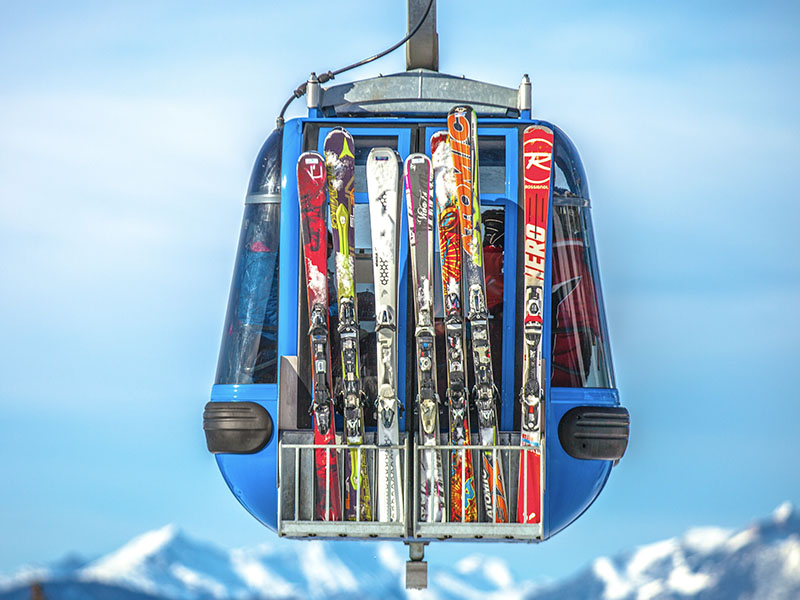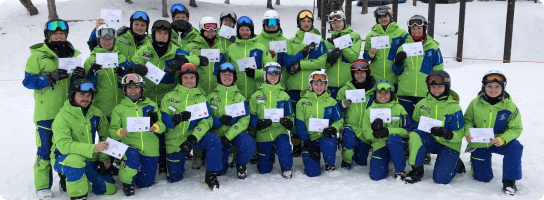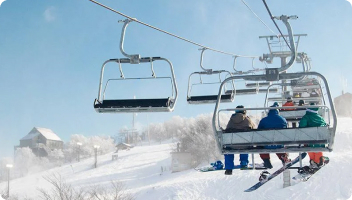by Jennifer Garston
Keeping Your Car Safe In The French Alps This Winter
In 2017/18, Storm Eleanor wreaked havoc in the French Alps. Heavy snowfall and avalanche warnings made it nigh on impossible for ski resort workers to travel to work in their vehicles as they found themselves snowed in in nearby villages.
In early December 2018, the French Alps experienced their first snowfall of the season, with between 30 and 100 cm falling in Southern areas, and much more is anticipated over the coming weeks and months. Therefore, when it comes to working during the French snow season, it’s essential you take steps to safeguard your vehicle so that you can safely get to and from the ski resort you work at.
Check the safety of your vehicle
Your vehicle’s battery is a crucial component to ensure you make it safely to work at the slopes. Car batteries have a typical life of four years. However, during severe cold weather extra strain is put on the battery due to the heating system and lights needing to be used much more frequently.
Therefore, you should routinely check that your car battery is in good condition with a multimeter tester. Other crucial parts on your vehicle to check regularly include the antifreeze level, lights, brakes, oil level, and your tire tread.
During your journeys to and from work at the French Alps, it’s best to be prepared for an emergency as extreme weather warnings can be issued at short notice. Ready.gov recommends that drivers check their antifreeze levels, brakes, heater, oil, windscreen wipers, and lights, among other items on a regular basis to ensure every trip in and around The Alps is as safe as can be.
Get snow chains & tires
There are areas of France and The Alps where snow chains are compulsory. However, even if you’re driving through a route where they’re not required by law, it’s advisable to have a set in your car as a sudden flurry of fresh snowfall can happen at any time in the region.
Chains can be quite difficult to fit, particularly if you have never had to do so before. In the middle of a storm, in freezing temperatures, is hardly the best time to try for the first time. Make sure you try at home in dry conditions at least once, before setting out. This will also ensure you have bought the correct size for your wheel.
Meanwhile, new legislation is set to come into force as of the 2019/2020 snow season. This will make it mandatory for light vehicles traveling in the French Alps to have winter tires fitted between November 1st and March 31st. So, it’s best to be prepared now and get your tires changed to winter ones for optimum safety.
Pack provisions
Legally, French law states that all vehicles driving on French roads must carry a reflective safety jacket, warning triangle, and a breathalyzer. In addition to these items, it’s advisable to pack provisions in case you find yourself stuck in the snow in the middle of The Alps following a sudden avalanche or heavy drift of snow. It’s sensible to carry around a shovel, windscreen scraper, flashlight, jumper cables, and tow rope in your vehicle.
Meanwhile, consider the emergency kit you may need if you do find yourself snowed in in your car or at your workplace ski resort, such as a blanket, scarf, gloves, food, drink, and medication.
Watch out for chips
It’s common for chips to appear in a car’s windscreen. And when your windscreen heaters are put on full blast onto the freezing cold glass, these chips can worsen and cause cracks to appear which can hinder your view when driving. With temperatures during snow season commonly sitting below zero, it’s essential that you make a habit out of checking your windscreen for chips. Should you notice any, be sure to use your resort wages to have your vehicle repaired and made safe again.
Drive safe
Driving in and around the French Alps is considerably different from driving on a standard road in the winter. You shouldn’t expect the roads to and from the ski resort to be gritted for your journey ahead. Therefore, it’s crucial that you know how to operate your vehicle in snowy and icy conditions so that you can stay road safe.
Rather than pulling away in first gear, chose the highest gear possible as this will give you better control of your vehicle. It’s also important to monitor your speed closely and avoid going too fast or too slow as this can result in accidents, especially on unfamiliar roads. And give your car’s engine a few minutes to warm up before each journey as this will minimize the risk of stalling in the snow.
Securing a job at a ski resort in the French Alps will provide you with a bundle of experience. However, when you’re making your way to and from work, you need to take precautions in your car, especially as freak weather conditions commonly hit The Alps during peak season.
For best practice, always carry out safety checks on your vehicle, get snow chains and tires, pack winter provisions for you and your car, be mindful of chips in your windscreen, and, most of all, take care when driving in adverse weather conditions.



